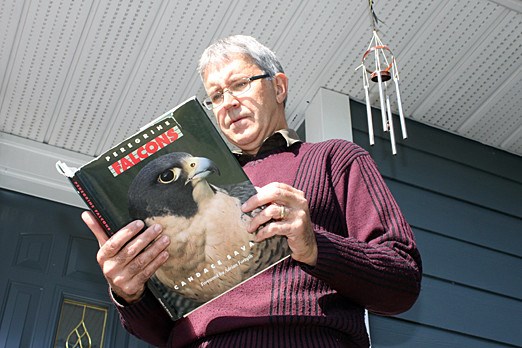A McGill University professors claims the proposed wind turbines on top of the Nor’Western Escarpment will not jeopardize the area's peregrine falcon population.
An advertisement for the controversial Big Thunder Wind Park quotes McGill University wildlife biologist David Bird as saying the proposed 16 wind turbines pose no threat to peregrine falcons breeding near the city.
It has been speculated that the Ministry of Natural Resources could prevent the project from moving forward because of the project's potential impact on peregrine falcon’s. In 2006 the falcons were taken off the endangered species list and officially categorized as threatened.
The federal government categorizes bird as a species at risk, a step below threatened.
Bird, who has written about peregrine falcons in Quebec and has participated in the recovery program for the animal, said he was hired by Horizon as an expert to give guidance to the company on their wind farm and whether it could impact the animal's population.
It's his opinion the bird has fully recovered in Canada.
“First of all, you have to look at the big picture in Canada,” Bird said. “Peregrine falcons have come back big time from coast to coast. The bird’s number is increasing exponentially and I don’t see any way how that wind park can have any kind of an impact on the population in Thunder Bay.
"I can count on one hand the number of peregrine falcons killed by wind turbines. They’re quite agile and any study shows they can go around wind turbines. Even if there was one or two peregrines killed annual, it’s going to have no impact on the population whatsoever.”
Bird visited the local site where the wind turbines are expected to be installed and he said it wasn’t even the right kind of territory for peregrines to hunt in. The birds prefer open areas and the cliffs make it far too difficult for them to catch their prey.
He added that he wouldn't be surprised if the peregrine was categorized as species of concern in the near future or taken off the federal list within a year.
Although, he hasn't personally done any studies in the area, he said Horizon Legacy has conducted studies using echo radar and observation as well as point counts for the past couple of years.
“It would be nice if we could put wind parks far way away from where people live and where you don’t have to look at them but the point is they have to be located near power grids,” He said.
“Sometimes that means you have to put them near various forms of wildlife. The thing is you have to weigh out the scientific evidence.”
But Brian Ratcliff, a biologist who has studied peregrine falcons in the district for more than 16 years, said he would like to see the data and studies Bird is basing his claims on.
He believes the biologist's opinion is just part of a Horizon Wind Inc. media campaign to rally support around its controversial wind-energy plans.
While Ratcliff acknowledged Bird’s credentials, he said he hasn't conducted studies in the area or at least any studies he knows about.
He also said he hasn't seen the ad yet.
“They have to prove what they put forward,” Ratcliff said. “That’s the bottom line here. They have to prove that they have done the research locally to make their statement and as far as I know they haven’t done anything.
"It’s my understanding that he has made blanket statements and you can’t do that. Every situation is different. He’s worked in northern Quebec on peregrines, but that’s a different habitat, they’re different birds.”
Ratcliff said just because the federal government has downgraded the bird's conservatory status doesn't mean it’s fully recovered.
In the end, Ratcliff said the decision rests with the MNR.
Ted Armstrong, a retired wildlife biologist who worked on the recovery project with peregrines and has worked with Bird, said he took issue with some of the wording his colleague used.
Armstrong also said the birds are recovering, but that doesn't mean they have recovered.
“There’s still things we need to do to ensure the species still recovers,” Armstrong said.
“Special concern seems to suggest there are some things we need to do to ensure the population continues to recover and we need to take prudence in our actions. I haven’t seen the reports his comments are based on. It’s always dangerous to rely on a quote extracted from a report or a memo.”
He said the comment in the ad about there being no threats to the peregrine is overstated.
He said there’s not many reports on peregrines on there but some studies have shown wind turbines have killed peregrines and a high number of raptors.
He added he was happy to see that peregrine falcons are a major consideration for the proposed wind farm.
